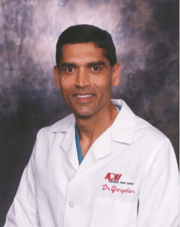 Patients needing a heart transplant can now turn to The Nebraska Medical Center, one of the busiest and most respected transplant hospitals in the country.
Patients needing a heart transplant can now turn to The Nebraska Medical Center, one of the busiest and most respected transplant hospitals in the country.
The United Network of Organ Sharing (UNOS) has approved a new heart transplant program for The Nebraska Medical Center, which will be led by Deepak Gangahar, M.D., the newly appointed chairman of cardio-thoracic surgery at the hospital and its partner, the University of Nebraska Medical Center.
The UNOS approval clears the way for The Nebraska Medical Center to begin adding patients to the transplant list immediately. Before a surgery will be done, however, the heart transplant team will go through extensive training to make sure each person is comfortable and confident with their roles in the procedure.
“If there is anything that exemplifies a team approach it is heart transplantation,” Dr. Gangahar said. “Every person from the hospital operator to the cardiac rehabilitation nurse and everybody in between plays a critical role in this program.”
Heart transplantation is the last option for patients with end-stage heart disease. We do everything possible to restore or improve functions of a patient’s own failing heart
whether it involves high risk coronary bypass surgery, reconstruction of patient’s native
heart valve or remodeling surgery of a patient’s main pumping chamber of the heart – the left ventricle. Transplantation becomes an option when nothing else can be done.
Candidates for transplantation are generally under 65 years of age and have no primary disease of any other organ. “Invariably patients who are referred for heart transplantation have already undergone two or three previous cardiac surgeries. When the clinical condition of these patients deteriorates so severely, using a mechanical heart can buy them time to regain strength and find a suitable donor organ,” Dr. Gangahar said. While mechanical hearts have come a long way in the last few years, it still forces the patient to endure two major heart surgeries.
Once a donor heart is found for a patient, the transplant team jumps into action – with half going to harvest the organ and the others staying behind to prepare the recipient for transplantation. Timing is key, said Dr. Gangahar. The heart can remain viable outside the body for four hours. The longer you wait, the weaker the heart becomes. So everyone has to have the same passion and intensity to help the patient.
“I am confident that we can take heart transplantation where Dr. Michael Sorrell and Dr. Byers Shaw Jr. have taken liver disease and transplantation; and where Dr. (James) Armitage and his team have taken bone marrow transplantation,” Dr. Gangahar said.
The team’s goal is to make a difference in the community, which has been missing this kind of care. Metropolitan Omaha cardiology and cardiac surgical services are second to none in the region. We do over 1,000 cardiac surgeries in this community but do not have our own heart transplantation program. The Nebraska Medical Center heart transplant program hopes to meet this need. Dr. Gangahar calls the new transplant program a tremendous challenge and a tremendous opportunity.
“We have every confidence in Dr. Gangahar’s vision, said Glenn Fosdick, president and CEO of The Nebraska Medical Center. “His expertise and talent coupled with the university’s research and innovation will create a center of cardiac excellence like no other in the Midwest.”
Dr. Gangahar expects to begin adding patients to the transplant list this spring.
“We have no preset goals regarding the number of cases we plan to do,” he said. “We will provide care to those who come with hope to The Nebraska Medical Center. But we must match national standards when it comes to outcomes and cost.”